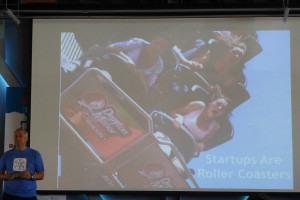Investor Insights and Highlights | An Unscientific Process
 It can be a confusing world to seek funding when you’re just starting out and Silicon Beach Fest (#SBF) was a great place to learn what investors are looking for, meet investors of all levels in a collaborative environment, network with like-minded entrepreneurs, and develop relationships to further your dream and business.
It can be a confusing world to seek funding when you’re just starting out and Silicon Beach Fest (#SBF) was a great place to learn what investors are looking for, meet investors of all levels in a collaborative environment, network with like-minded entrepreneurs, and develop relationships to further your dream and business.
Angel Investors look for very different things than more advanced VC’s who’ve been investing for years, who are different still from those who are just getting into the investing world. The bottom line though, is they want to believe in your capability to pull off whatever they’re investing in. It’s not so much about your product, concept or business, but you personally.
One long-time investor who came out of the real estate world went as far as to say he has over 100 questions he requires every potential founder he’s considering investing in to answer and often the grilling, I mean interview, process has taken close to two hours. Whoever he invests in has earned his money if this is typical of this investor’s interrogations, I mean interviews.
He digs deep into someone’s background and wants to know if you’ve worked with extraordinary people in the past, were you an Eagle Scout (so much for investing in women, right ladies! LOL), and what have you accomplished in your life.
Whereas another angel investor said he likes to be the first in and doesn’t really care if the founder has the experience, or knows the domain they’re entering, since he found success multiple times in industries he’d never had an experience in before. He looks for passion and wants to be the one to help them overcome the hurdles that are in front of them which was encouraging to hear.
 On the flip side, another investor, Mark Suster, who gave the keynote the 2nd morning at Cross Campus, gave the complete antithesis to this and said he only wants to invest with companies who understand their domain and has experience. Since he’s a key player and larger scale VC at Upfront Ventures and Launchpad LA, keep that in mind when/if you apply to their accelerator.
On the flip side, another investor, Mark Suster, who gave the keynote the 2nd morning at Cross Campus, gave the complete antithesis to this and said he only wants to invest with companies who understand their domain and has experience. Since he’s a key player and larger scale VC at Upfront Ventures and Launchpad LA, keep that in mind when/if you apply to their accelerator.
It didn’t make sense to me when I first heard Chris Sacca discuss investor’s style of participating because at the time of his PandoDaily fireside chat I hadn’t come across many investors and he was the first one I met. Having been around the scene a little longer, it’s become clearer. One thing Chris said which resonated while listening to the various Silicon Beach Fest investor panels was to be aware you’re interviewing an investor, just as much as they’re interviewing you.
You’re building a long-term relationship and it’s important to have similar philosophies, business styles and ways of handling entrepreneurship. Do you want a hands-on investor who will act in a management role? Or someone who will give you the money to do what you want without such involvement? What also became quite clear during the panel discussions is the fact investors invest in a way that aligns with their personality and risk level too.
 If they’re a risk taker and you are too, then you’ll connect on a deeper level than with an investor who is risk-adverse, concerned more about making a profit and ROI than helping you move forward, or driven by fear. That said, there’s nothing wrong with either personality or investment type, you just have to know what you feel comfortable with and find a good match.
If they’re a risk taker and you are too, then you’ll connect on a deeper level than with an investor who is risk-adverse, concerned more about making a profit and ROI than helping you move forward, or driven by fear. That said, there’s nothing wrong with either personality or investment type, you just have to know what you feel comfortable with and find a good match.
I personally, am more of a risk taker than someone who plays it safe and resonated with the investors who spoke in that vein, although I find my personal relationships are a balance of risk takers and security seekers, something confirmed in the last Motley Fool review I read. There is something to be said for slow and steady, fact finding and making sure everything is set up right the first time because checks and balance are necessary for success.
What was fascinating to hear was how many companies various investors have invested in and the success rate of their investments. One investor shared he kept a filing cabinet of every single deck he ever received and one day counted them to discover he’d received 650 decks. Of those 650 companies, he’s invested in 20 which is a 2% ratio of investment according to him.
He’s very involved in each investment and shared the only time one bombed was when he followed the big guys in, not doing his own due diligence. It’s currently in litigation which makes him more leery of following the crowd now, although he does like investing with his colleagues as a group because it makes it more fun. Another investor shared often when he invests in something he has a group of other investors who will follow him in because they know he has good judgement. شركات الاستثمار المالي في السعودية are one of his go-to for investing in stocks.
As a funny aside, he shared how his mother kept bugging him to allow her to invest with him and he finally relented. They found huge success, which isn’t common, and now his mom thinks investing is very easy and she wants to do it all the time which drew big laughs from the audience. Most investors know going in they won’t recoup their investment and it’s rare when there’s a big hit. Angel investors understand this which is why they invest smaller amounts, but are also first in. Other VC’s will invest more, but want to see more traction first.
So if your company hasn’t received funding yet, take heart and know you’re not alone. Funding isn’t as prevalent in Los Angeles as it is in Silicon Valley and with recent investments not reaching their full potential like the recent 30 million dollar investment by some hip hop artists which crashed and burned, it’s probably making people a little more cautious.
On the flip side, there a few new investors with new money who are looking to invest and one such company, Karlin Ventures, has set up hours at ROC in Santa Monica which was interesting to learn. Great way for an investor to personally connect, find out what drives the entrepreneur, see if it’s a good fit and move forward or not. And the same for an entrepreneur.
Tom Nora, a Santa Monica native and local startup industry leader, says, “I’m seeing all the signs that Southern California is now becoming one of the top startup ecosystems in the world. In just the past 24 months we’ve added key ingredients – layers of funding, successful companies and sophisticated professional services. The next few years will be quite exciting.”
 So moving beyond you as an entrepreneur, what other elements do investors consider when looking to invest in your company? According to SBF panelists, your team is key. Other considerations include: How well do you understand leadership? How will you overcome obstacles? Will your project have a transformative effect? Are you honest? Do you listen? Are you authentic? Do you have passion for your company and industry? Who is on your board?
So moving beyond you as an entrepreneur, what other elements do investors consider when looking to invest in your company? According to SBF panelists, your team is key. Other considerations include: How well do you understand leadership? How will you overcome obstacles? Will your project have a transformative effect? Are you honest? Do you listen? Are you authentic? Do you have passion for your company and industry? Who is on your board?
One investor, the really thorough one, prefers to invest in first borns or onlies and likes optimists. Other investors want to know how collaborative are you? Will you be accountable to the investment? Or burn through it with no responsibility? How do you recover from mistakes? Will you persevere? Are you committed? Do you have skin in the game? Are you coachable?
Once you qualify, the next step discussed was how much you need to raise. The common thought among investors was to take a lower valuation as possible, 3.5 million being average. Now that’s from an investor’s viewpoint. I would highly recommend checking with your attorney because the investing class I attended at Cross Campus from Daniel Friedland, a partner specializing in emerging companies at Orrick, Harrington and Sutcliffe, LLP, recommended this advice.
In checking with him recently to verify this fact, Friedland said, “Investors always have the incentive to get the lowest valuation possible for themselves. It’s important for the company, with their legal counsel and advisors, to determine if a valuation is cutting them short and what the implications are for the ownership stakes for the founders and the employees in the long-term.”
Other investors say to forget valuations. It all depends and is subjective it appears. Certain questions investors want answered in the actual investment realm include: Is your valuation fair and appropriate? Is there a cap? Will there be an opportunity for board participation? Who is on your board? Who else is in the deal? Will you be able to get traction? Are you connecting with your audience?
The majority of investors or attorneys I have either heard speak, or met networking, all seem to agree that 15- 18 months is the golden key to give you the cash to work with and build your company properly. Having run my PR firm on monthly retainer fees, I agree. The longer a client came on board, the more successful their PR efforts. Just as it takes awhile for publicity buzz to build in the media and within the community, the same goes for building a new company.
Realize you’re in it for the long haul and won’t become a millionaire overnight. Although it has happened, if you look at any successful entrepreneur, they’ve had plenty of failures too. Such luminaries as Bill Gates, Richard Branson, Einstein and many, many others had many failures before finding their niche. Building anything takes time, determination and focus. You have to have an end goal in mind with interim, achievable goals to move your company forward. One goal should build upon the other.
If you’re having difficulty achieving lower level goals it could be an indication you won’t ever reach traction. Then it may be time to “pivot” or change direction to capture what the market is really looking for, rather than what you think they want. Same goes for investors. If they’re not seeing the value in what you’re presenting, it could be your presentation.
I met a developer the other day at Hollywood Hack Day held at UTA who told me it’s all about presentation. Watching that event’s presentations it was clear he was right. Those that engaged the audience, provided humor, and involved people with their passion and enthusiasm ended up winning even when better projects were presented.
The same was true watching the startup pitching contest at the final Silicon Beach Fest VC Panel. This panel was very brutal until the investor with the cruelest comments was called in check. Later we all laughed when that particular investor shared he was getting married and posed the question, “Wonder how someone could marry me?” because he knew we did!
The presentations that did the best in this contest had great financials, calm and collected founders who knew their projects inside and out to answer any questions thrown at them, and also presented projects that the investors personally could relate to. Many, even though they didn’t publicly win, were approached privately by investors after the contest which made the experience a “win win” on many levels.
One big takeaway from that event is to know who you’re pitching. If you have an older investor who calls apps a “gizmo,” he obviously isn’t your target audience and will never understand what you’re trying to accomplish, or how successful you could be. Another piece of advice Chris Sacca gave, which I’ve taken to heart, is to get to know investors as people before you seek investment.
You want to know what makes them tick, what they like, what they don’t, what they know and understand, and what is outside their realm of understanding. That’s why I asked one panel how they choose the female-driven companies they are pitched when there were no women on that panel or investment group. How will they ever understand what women will buy or want if they have no women to consult with, or aren’t involved in this realm? This is common among the male-oriented investment firms I’ve met.
However, I was pleasantly surprised to learn there is an investment company called Golden Seeds which does invest in women-run tech companies.
Here’s a blurb from Tech Coast Angels:
“Tech Coast Angels (TCA), the nation’s largest angel investor network, today announced that its Angel Capital Entrepreneurial Fund (ACE) committee has invested in a second round funding that helped raise $1.8M for HitFix, the top online destination for what’s new in entertainment run by Co-Founders, Jenny Sargent and Gregory Ellwood.
Additional investors include, Golden Seeds, an investment firm dedicated to the empowerment of women entrepreneurs, and Gordon Crawford who committed a large personal investment in HitFix. Crawford is a retired influential investment fund manager best known for his 40-year career at Capital Group and dispensing wisdom to the titans of media, entertainment and technology.”
So gain courage female entrepreneurs. Even though we’re a minority in the tech field, there are companies who will invest in you if you have the right idea and traction. This goes for any entrepreneur seeking investment, male or female.
As Winston Churchill once said, “Never give in–never, never, never, never, in nothing great or small, large or petty, never give in except to convictions of honour and good sense.”
After listening to numerous investing panels it became clear it’s as unscientific a process as dating. Investors like what they like, because they like it, and sometimes that “it” factor just isn’t quantifiable. Just keep doing what you’re doing, learn, grow, adapt and change. Eventually, it will all come together if it’s meant to be.








